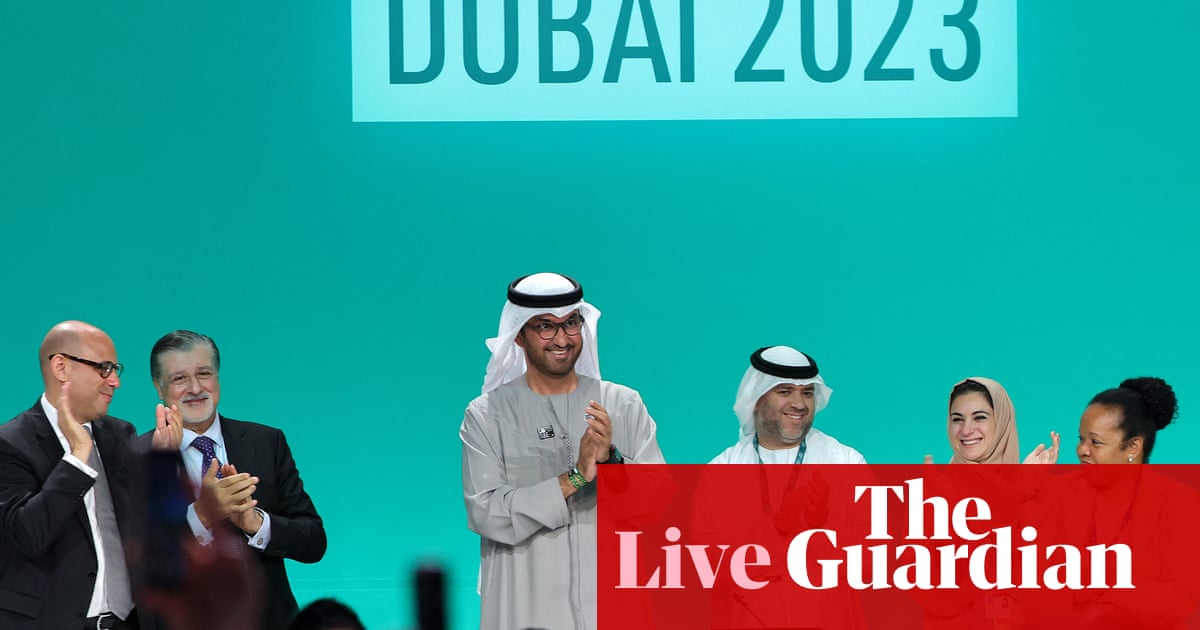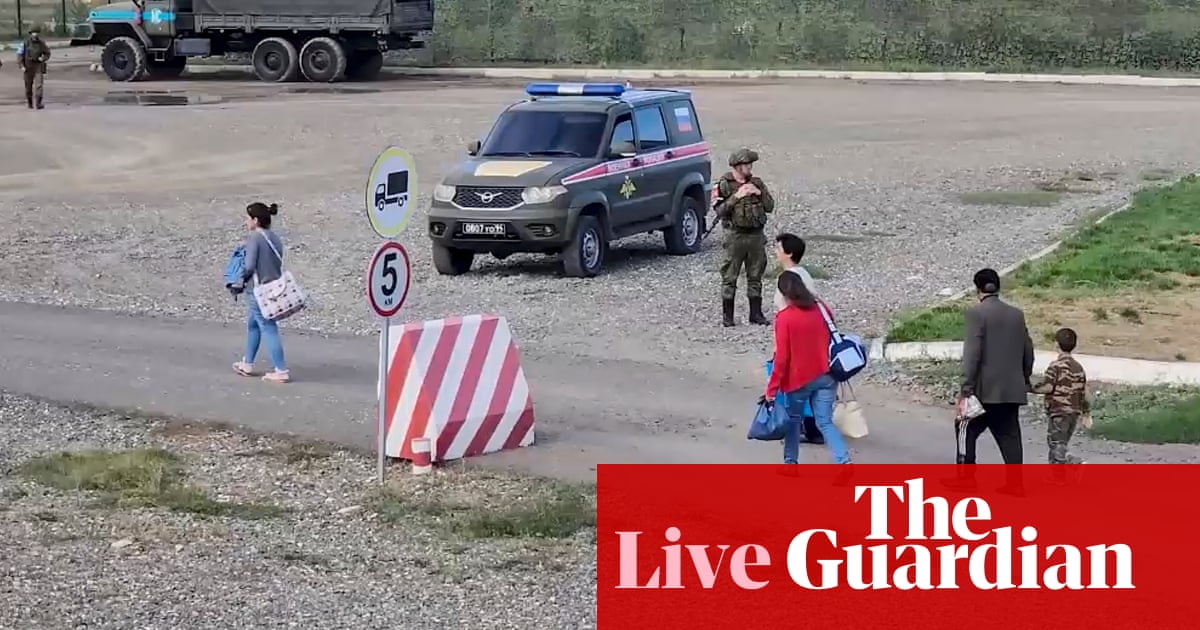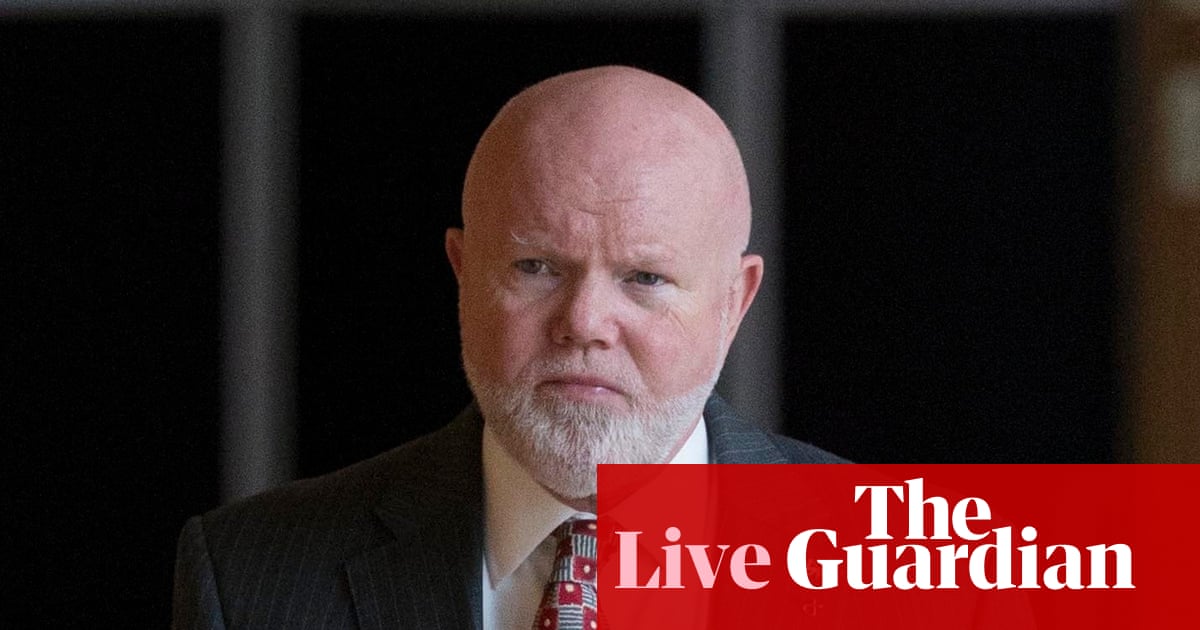
A deal has been gavelled
We have a deal. The COP29 President Mukhtar Babayev has just brought down his gavel on a financial deal which no one is very happy with but which is, nonetheless, a deal.
As Babayev gavelled through the deal there was long standing applause, cheering, whistling. negotiators embracing.
After a lengthy speech by Simon Stiell and an even longer one by Mukhtar Babayev, the plenary is drawing to a close. My colleagues in Baku have written about developments this evening here:
We will have more coverage and reaction in the coming days, but we’ll end the liveblog here. Thanks for reading, and especially to those of you who got in touch by email or social media. See you in Belem!
Juan Carlos Monterrey Gómez, Panama’s special representative for climate change and who gave a barnstorming speech earlier in Cop29, says the global temperature target of 1.5C is dead with the level of climate finance agreed. He said developing nations had to accept the deal though, because Cop is the only forum for them to pursue the climate action so desperately needed.
“I think 1.5C was at the intensive care unit and it feels like that bed just broke and it fell on the floor. So we’re probably not going to be able to reach 1.5C based on this very low level of finance being provided by the developed world. That means death, that means misery, for our countries.”
“The gavel was hit way too fast and our heart goes out to all those nations that feel like they were walked over. Developed nations always throw text at us at the last minute, shove it down our throat, and then, for the sake of multilateralism, we always have to accept it, otherwise the climate mechanisms will go into a horrible downward spiral, and no one needs that.
This is the only space that we have to negotiate and to work towards our common goals. We accepted the text because we could not leave Baku without a text, but we’re not satisfied whatsoever.”
In his closing remarks Babayev said “we have reached the end of a defining chapter in the climate crisis”
He thanked everyone involved from negotiators to activists to “thousands of volunteers” to major applause.
“Since the beginning of this journey, people doubted Azerbaijan could deliver,’ he said, adding that they “hosted one of the largest cops with only 11 months to prepare”.
Deals made at Cop29 will “mean more coal plants decommissioned” and more “wind plants build” he said. On finance, he said “we had many difficult conversations” and insisted the presidency pushed countries to be ambitious.
He ended by telling viewers: “Never forget the power of your contribution” and that “protecting the planet is an act of solidarity”.
“India called out on how the decision let down peoples of the developing world, but was ignored when it objected, it was outrageous,” said Meena Raman, a veteran Cop observer and head of programmes of Third World Network. “The goal is paltry and does not guarantee any provision as it only about mobilisation. It is a great escape by developed countries of their obligation to clearly indicate what they will provide. [This deal] is nothing to cheer about: it is inadequate and insufficient to meet the needs and priorities of developing countries.
“This deal is the result of big bullying by developed countries to escape their obligations by a smoke and mirror decision that is unclear on what will be delivered. The US, who Trump has said is exiting the Paris agreement, had a huge influence in crafting a decision that is hollow and full of loopholes that shifts responsibility to developing countries through their own efforts. It is a do-it-yourself pact.”
Amar Bhattacharya, Vera Songwe and Nicholas Stern, the leading economists and chairs of the Independent High-Level Expert Group on Climate Finance, have released a statement welcoming the finance agreement: “It is important that work starts immediately on scaling up external finance from all sources for developing countries towards a target of $1.3tn per year by 2035. The commitment from developed countries of $300bn per year by 2035 primarily from bilateral and multilateral sources of public finance is an important advance on current levels, but falls short significantly of the at least $390bn a year by 2035 which our work shows would be required to deliver the goals of the Paris agreement.
“It is important that work starts immediately on the urgency of delivery, the quality of and access to finance, and reducing the cost of capital. Therefore we welcome the emphasis in the agreement on the new goal on delivery, monitoring and transparency. It is crucial to work together to begin ramping up financial support from all sources immediately to assist developing countries in making stronger pledges for action.”
Mary Robinson, the former UN envoy and senior climate figure said: “Cop29 in Baku has been one of the most difficult Cops I can remember. It came very close to failure and it has ended with a disappointing deal. But it is a deal the world can build on in 2025.
“The $300bn per year committed by 2035 by rich countries at Cop29 falls $90bn short of the amount needed to implement the Paris agreement. This is nowhere near enough to support developing countries. But the intention in the deal to generate at least $1.3tn from a wider range of sources is right. This is an investment, not a handout.
“Cop29 was weak in transitioning away from fossil fuels. Oil-rich countries must see that their efforts to delay the inevitable will fail. The green energy transition has gained unstoppable momentum, driven by competitive prices and market demand.”
Some developed countries have made barely veiled swipes at Saudi Arabia over its obstruction of the text including an explicit restatement of some of what was agreed in Dubai last year – particularly, goals of transitioning away from fossil fuels, tripling renewable energy by 2030 and doubling energy efficiency by the same year.
Instead, the text just refers to paragraph 28, in which the transition commitment was made, calling on countries “to contribute to the global efforts referred to in paragraph 28”.
Speaking on behalf of the umbrella group of developed countries, Australia said it was disappointed that some countries had “stalled or stymied discussion” on those issues. But they said that countries were accelerating towards the global goal of net zero emissions and moving to capture the economic opportunities of renewable energy to create jobs for their communities.
Switzerland said Cop29 fell short on “meaningful ambition” and it regretted the text “had been watered down by some”. “We can and must do better next year,” they said.
Pakistan says the decisions reflected the spirit of multilateralism, but it would leave Baku “with mixed feelings and a heavy heart” as the goals put forward by demonstrated countries do not match needs of developing countries.
Its representative said it had faced devastating floods and heatwaves and melting glaciers, and too much climate finance was being given as loans. It meant the climate crisis was “converting into a debt crisis”.
“We demand climate justice. It isn‘t charity. It’s a moral obligation.”
Harjeet Singh, a highly regarded campaigner at Cops and at the Fossil Fuel Non-Proliferation Treaty Initiative, says the fight will have to go on:
“At Cop29, developed nations once again coerced developing countries into accepting a financial deal woefully inadequate to address the gravity of our global climate crisis. The deal fails to provide the critical support required for developing countries to transition swiftly from fossil fuels to clean, renewable energy systems, or to prepare for the devastating impacts of the climate crisis, leaving them severely under-resourced.
“We must persist in our fight, demanding a significant increase in financing and holding developed countries to account for delivering real, impactful actions.”
After Babayev gavelled through the global stocktake, a negotiator from Chile registered his disapproval.
“In our view the text that we have in front of us lacks a number of very important elements,” he said, arguing it does not reflect the tools needed to inform climate plans (NDCs). “In our view the text does not enjoy consensus,” he said.
A Fiji negotiator said that in negotiations around the global stocktake, his nation has been asked to “ignore our needs” and “step backward.”
A Canadian minister also registered his disappointment, as did an Australian negotiator.
UN secretary general António Guterres, who at the start of Cop29 said the climate crisis had made 2024 “a masterclass in human destruction”, expressed disappointment:
“Developing countries swamped by debt, pummelled by disasters, and left behind in the renewables revolution, are in desperate need of funds. I had hoped for a more ambitious outcome – but this agreement provides a base on which to build. It must be honoured in full and on time. Commitments must quickly become cash. All countries must come together to ensure the top-end of this new goal is met.”
Simon Stiell, the UN’s top climate official, said: “It has been a difficult journey, but we’ve delivered a deal. This new finance goal is an insurance policy for humanity, amid worsening climate impacts hitting every country. But it only works if the premiums are paid in full, and on time. No country got everything they wanted, and we leave Baku with a mountain of work still to do. We need to redouble our efforts on the road to Belém [Cop30 in 2025].”
Former US vice-president Al Gore, who has been a prominent voice on climate matters for decades, has weighed in:
While the agreement reached at Cop29 avoids immediate failure, it is far from a success. On the key issues like climate finance and the transition away from fossil fuels, this is — yet again — the bare minimum.
We cannot continue to rely on last-minute half measures. Leaders today shirk their responsibility by focusing on long-term, aspirational goals that extend far beyond their own terms in office. To meet the challenge of our time, we need real action at the scale of months and years, not decades and quarter-centuries.
This experience in Baku illuminates deeper flaws in the Cop process, including the outsized influence of fossil fuel interests that has hobbled this process since its inception. The Kingdom of Saudi Arabia has been particularly obstructive. Putting the future of humanity at severe risk in order to make more money is truly disgraceful behaviour. Reforming this process so that the polluters are not in effective control must be a priority.
On climate finance, our primary task in the coming years must be to not only fulfil and build upon the financial commitments agreed to at Cop29, but to unleash even larger flows of affordable and fair private capital for developing countries.
Ultimately, coming out of Cop29, we must transform disappointment into determination. We can solve the climate crisis. Whether we do so in time to meet the goals of the Paris Agreement will depend on what comes next.
Wopke Hoekstra, the EU commissioner for climate action, has a far more positive take on the Cop29 deal, and it is received with zero applause, unlike the angry speeches from India and Nigeria.
“We all know how very, very difficult this was, and yet we do feel that the result of today is actually exceptionally important. We are living in a time of truly challenging geopolitics so seeing a deal truly is exceptional.”
“In my view, Cop29 will be remembered as a start of a new era for climate finance and we have worked hard with all of you to ensure that there is significantly more money on the table. We’re tripling the $100bn goal, and we feel it is ambitious, it is needed, it is realistic and it is achievable.”
Hoekstra also alludes to the row over whether countries like China and Saudi Arabia should contribute to climate finance, despite being classed as developing in UN climate talks:
“It is also a matter of fairness and of importance to us that all those with the ability to do so should contribute, and therefore it is good that we enlarge the contributor base on a voluntary basis.”
On the lack of explicit mention of last year’s commitment to “transition away from fossil fuels, he says: “It is less than what we have liked, but it is better than we feared.”












